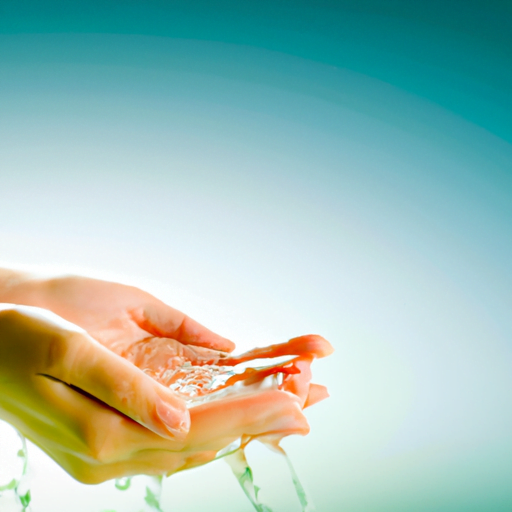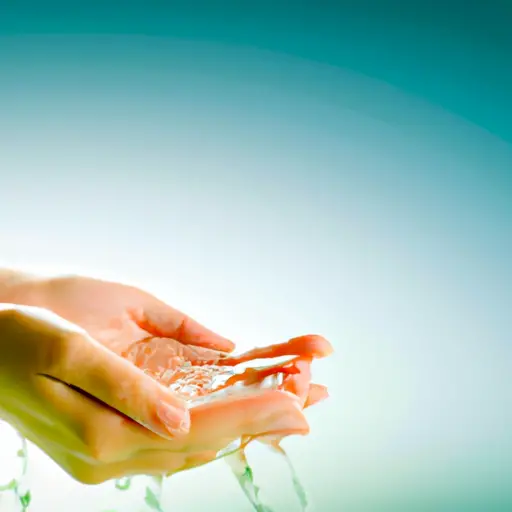So, you’ve been exploring the idea of off grid living and you’re wondering about the benefits of showering with well water. Well, let me tell you, there are quite a few advantages to this! First of all, well water is typically free from added chemicals like chlorine, which can be harsh on your skin and hair. This means that your showers with well water can leave you feeling refreshed and rejuvenated, without any unwanted side effects. Plus, well water often has a more natural and clean smell, compared to the sometimes strong, chemical odor of treated water.
But that’s not all! Well water also tends to be softer than municipal water. This means that it doesn’t contain as many minerals like calcium and magnesium, which can leave residue on your skin and make it feel dry and itchy. So, when you shower with well water, you may find that your skin feels smoother and more moisturized. And for those with sensitive skin, this can be a game changer!
In addition, well water is usually sourced locally, right from your own property. This means that it hasn’t traveled through miles of pipes before reaching your showerhead, potentially picking up contaminants along the way. Instead, it’s a direct connection from the earth to your bathroom, providing you with a more pure and natural water source. So, if you’re considering off grid living and the benefits of showering with well water, you can expect a refreshing and eco-friendly experience that will keep you feeling clean and nourished. To learn more about this topic, check out our detailed article on the advantages of well water for showers.

Introduction
Exploring the Benefits of Showering with Well Water
Off-grid living has become increasingly popular in recent years, as individuals seek to disconnect from the dependency on public utilities and embrace a more sustainable lifestyle. One crucial aspect of off-grid living is water supply, and many choose to utilize well water as their primary source. But can you shower with well water? In this article, we will delve into the world of well water and uncover the benefits and considerations of using it for your showers.
Understanding Well Water
What is well water?
Well water refers to groundwater that is extracted from wells dug deep into the earth. It is typically found in aquifers, rocks, or soils that contain large amounts of water, such as underground reservoirs. The quality of well water varies depending on the location and geological characteristics of the environment it comes from.
Benefits of using well water for showers
There are various benefits to using well water for your showers, which we will explore in more detail. These include natural mineral enrichment, improved hair and skin health, as well as cost-effectiveness and sustainability.
Potential drawbacks of well water for showers
While well water has its advantages, there are also some potential drawbacks to consider. These include the need for water quality testing and filtration, monitoring of water pressure and temperature, as well as the maintenance and upkeep of the well system.
Advantages of Showering with Well Water
Natural mineral enrichment
One of the significant advantages of using well water for your showers is the natural mineral enrichment it provides. Unlike treated water from municipal sources, well water often contains essential minerals such as calcium, magnesium, potassium, and iron. These minerals can have various health benefits and may improve the overall quality of your hair and skin.
Improved hair and skin health
Showering with well water can have a positive impact on both your hair and skin health. The natural minerals present in well water can help soften your hair, making it more manageable and reducing the occurrence of frizz and dryness. Additionally, the minerals can nourish your skin, leaving it feeling smoother and more hydrated.
Cost-effectiveness and sustainability
Using well water for your showers can be cost-effective and sustainable in the long run. Unlike treated water from public utilities, well water is usually free of charge. Additionally, relying on well water reduces the demand for treated water, ultimately benefiting the environment by conserving resources.
Health Benefits of Well Water Showers
Softening effects on the skin
Well water’s natural mineral content can have a softening effect on the skin. The minerals, particularly calcium and magnesium, help to moisturize and hydrate the skin, resulting in a smoother and healthier complexion. This can be particularly beneficial for individuals with dry or sensitive skin, as well as those who suffer from skin conditions like eczema or psoriasis.
Reduced exposure to harmful chemicals
One of the primary advantages of using well water for showers is the reduced exposure to harmful chemicals. Treated water from public utilities often contains chlorine and other disinfectants, which can strip the skin and hair of natural oils, leading to dryness and irritation. Well water, on the other hand, is typically free from these chemicals, resulting in a gentler and more nourishing showering experience.
Promotion of healthy blood circulation
Showering with well water has been associated with the promotion of healthy blood circulation. The minerals present in well water help to dilate blood vessels, allowing for improved blood flow throughout the body. This can have various health benefits, including the reduction of inflammation, relief from muscle soreness, and the improvement of overall cardiovascular health.

Environmental Benefits of Well Water Showers
Reduced water waste
Using well water for showers can significantly reduce water waste. Unlike treated water from municipal sources, well water does not go through extensive treatment processes that often result in significant water losses. By relying on well water, we can help conserve our planet’s precious water resources.
Decreased dependency on treated water
Another environmental benefit of showering with well water is the decreased dependency on treated water. Treated water requires energy-intensive processes such as filtration and disinfection, which contribute to carbon emissions and environmental pollution. By utilizing well water, we can reduce our carbon footprint and minimize the strain on public water supplies.
Lower carbon footprint
Well water showers also contribute to a lower carbon footprint in other ways. By reducing the demand for treated water, fewer resources are required for its production, transportation, and distribution. Moreover, because well water does not need to be treated with chlorine or other chemicals, it eliminates the need for the associated manufacturing processes, further reducing the environmental impact.
Considerations for Showering with Well Water
Water quality testing and filtration
One crucial consideration when showering with well water is the need for regular water quality testing and filtration. Well water is susceptible to contaminants, such as bacteria, nitrates, and heavy metals, which can impact its safety and quality. It is essential to have your well water tested periodically and install appropriate filtration systems to ensure that it is safe for showering and other household uses.
Monitoring water pressure and temperature
Another consideration is the monitoring of water pressure and temperature when using well water. Unlike treated water from municipal sources, well water pressure can fluctuate, depending on the water table’s level and the well pump’s capacity. It is essential to install pressure regulators and temperature control systems to maintain a consistent and comfortable showering experience.
Maintenance and upkeep of well system
The maintenance and upkeep of your well system are also critical for optimal well water showers. Regular inspections, well cleaning, and pump maintenance are necessary to ensure the longevity and efficiency of your well system. Furthermore, monitoring the water level in your well and taking appropriate measures during periods of drought or extreme weather conditions is crucial to avoid any issues with your water supply.
Comparing Well Water to Other Water Sources
Differences between well water, tap water, and bottled water
Understanding the differences between well water, tap water, and bottled water can help you make an informed decision about your water source for showers. Well water is sourced from natural underground reservoirs and contains varying levels of minerals. Tap water, on the other hand, is sourced from public utilities, treated, and piped into homes. Bottled water is often sourced from natural springs and undergoes filtration and testing.
Factors to consider in choosing the right water source
When choosing the right water source for your showers, several factors should be considered. These include water quality, availability, cost, environmental impact, and personal preferences. Well water may be suitable for individuals who value natural mineral enrichment and sustainability, while others may prefer the convenience and reliability of treated tap water or the portability of bottled water.
Impacts on health and the environment
The choice of water source for showers can have significant impacts on both our health and the environment. Well water showers offer the advantages of natural mineral enrichment and reduced exposure to harmful chemicals, promoting healthier hair and skin. Additionally, choosing well water over treated water can contribute to water conservation efforts and reduce our carbon footprint, benefiting the environment.
Best Practices for Showering with Well Water
Pre-shower skin and hair preparations
To maximize the benefits of showering with well water, there are a few best practices to consider. Before stepping into the shower, it is advisable to prepare your skin and hair by rinsing them with warm water. This helps to open up the pores and allows the natural minerals in the well water to penetrate more effectively.
Optimal showering techniques
When showering with well water, using optimal showering techniques can help enhance the benefits. Avoid using excessively hot water, as it can strip the skin and hair of their natural oils. Instead, opt for warm or lukewarm water temperatures. Additionally, it is important to avoid over-shampooing and over-cleansing, as this can lead to dryness and irritation. Let the natural minerals in the well water work their magic.
Post-shower care and moisturization
After showering with well water, it is essential to moisturize your skin and hair to lock in the hydration. Use a quality moisturizer or oil to replenish any moisture lost during the showering process. For your hair, consider using leave-in conditioners or natural oils to maximize the softening and nourishing effects of the well water.
Addressing Common Concerns about Well Water Showers
Smell and taste of well water
One common concern about well water is its smell and taste. Well water can sometimes have a distinct odor or taste due to naturally occurring sulfur compounds or elevated mineral content. However, the smell and taste can vary significantly depending on the specific well and its location. In some cases, installing water filtration systems, such as activated carbon filters, can help alleviate these concerns and improve the overall taste and odor of the well water.
Potential for bacterial contamination
Another concern when showering with well water is the potential for bacterial contamination. While well water can be safe for showering, it is important to regularly test and treat your well water to minimize the risk of bacterial infections. Consult a professional well water testing and treatment service to ensure that your well water is free from harmful microorganisms.
Impact on household appliances
Using well water for showers may have implications for household appliances. Well water often contains minerals, such as calcium and magnesium, which can accumulate and result in limescale build-up in appliances like water heaters and washing machines. Regular maintenance and periodic descaling of these appliances can help mitigate any adverse effects on their performance.
Well Water Showers for Off-Grid Living
Benefits of well water for off-grid homes
Well water showers are particularly beneficial for those living off-grid. Off-grid homes rely on self-sufficiency and sustainability, and utilizing well water aligns perfectly with these principles. Well water is readily available, reduces the need for external water sources, and promotes a more natural and eco-friendly lifestyle.
Installation and maintenance considerations for off-grid systems
When installing a well system for off-grid living, there are several considerations to keep in mind. Proper well placement, drilling, and pump installation are crucial for ensuring a consistent and reliable water supply. Additionally, regular maintenance, such as well cleaning and pump checks, is necessary to keep the system functioning efficiently.
Water conservation strategies
In off-grid living, water conservation is a vital aspect. Implementing water conservation strategies, such as installing low-flow showerheads and eco-friendly plumbing fixtures, can help minimize water usage without compromising the showering experience. Properly managing and maintaining your well system also plays a significant role in water conservation efforts.
Conclusion
Showering with well water offers a multitude of benefits for your health, the environment, and off-grid living. From natural mineral enrichment to improved hair and skin health, the advantages are numerous. By reducing water waste, decreasing dependency on treated water, and lowering your carbon footprint, you contribute to a more sustainable future. However, it is important to consider water quality testing, pressure and temperature monitoring, and regular maintenance of your well system to ensure optimal showering experiences. With proper knowledge and care, you can enjoy the many benefits of showering with well water and embrace a more sustainable lifestyle.




